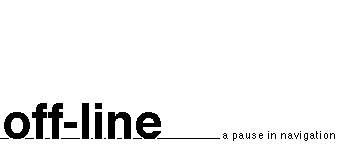In spite of all the rhetoric on the new economy, some large companies are deliberately placing their best managers and executives on mature markets. Leaving innovation to relatively less reliable staff – and to people that have become "redundant" because of mergers or downsizing. There is a quaint logic in this choice. In the "old" economy every fraction of a point of market share must be held or gained in a strongly competitive environment. In the new (they think) fast growth can take care of almost anything; mistakes or misdirections can fade away in the turbulent flux, blurred and swallowed by the general expansion of the market.
It's hard to tell if these are rational decisions – or elaborate excuses for confused management. Is this just hype or speculation? What can the new tools and the new strategies really do for me? We need to mind the shop while someone dreams about the future... The irony is that sometimes they can be lucky. People that don't fit well into a traditional hierarchic organization aren't always the weakest; they can be unusually bright and more adaptable to change and innovation. Talented people can be made "redundant" by restructuring and slimming. But doing "the right thing for the wrong reason" isn't good enough. The new economy is too important to be left to chance or luck.
Is it wise to let new ventures be carried by the tide, no matter where it's going and why? Easy as it sounds, it can be very dangerous. A lot of money can be wasted. If buildings are allowed to grow with weak foundations and poor design, they can be painfully expensive to demolish or re-structure. What's worse, big opportunities can be missed. There is no effective replacement for serious commitment and deliberate learning from experience.
Things get even more complicated when financial deals and venture capital get into the act. Investors are looking at a confused and perplexing environment. Their reasoning is simple: if we invest in several different things, and one in four succeeds, that will take care of our losses on the other three. The result is that they have their fingers an all sorts of pies and they try to make each one of their ventures help the others. Often it doesn't work, for three reasons. The resources that a company is forced to use may not be the ones that fit its needs. When people can't choose, they don't feel responsible (if results aren't good it isn't my fault). Most teams are somewhat lackadaisical about "captive" customers while they concentrate their best energies on the business they could lose.
And of course there are jobs and assignments going to relatives, friends and protégés; as well as unloading of not-so-good people from one company in the club to another. When all of this combines with a tendency to keep the best resources on the old side of the business, the effect is quite disastrous on motivation, commitment, efficiency and quality.
The new economy isn't a dream. It isn't easier than the old; it needs even more dedicarion and talent. It's a delusion to think that some magic flux in the turbulence will bring to a safe landing any raft, even without a rudder and a compass. It's not enough to get into the act "just to be there", or to wander into the jungle hoping to stumble on the right path. It takes flexibility and a willingness to try and risk; but also a firm strategy and a clear sense of direction.
Companies and people are beginning to understand that the net isn't science fiction or fantasy. It isn't a mysterious planet populated by androids, robots, automatons and dangerous or incomprehensible aliens. It's a web of human relationships with strong values and great opportunities. A shift from bewilderment to enthusiasm is a good starting point. But this is no place for lost children, gremlins, simulacra or blade runners. It's for real, bright and determined people. It is, indeed, promising; but that doesn't make it easy. It takes even greater commitment and discipline than competition in the old economy. With an extra dose of courage and imagination; and a genuine desire to listen and learn.



